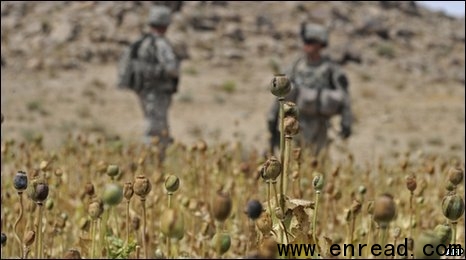| ||||||||||||||||||||||||||||||||||||||||||||||||||||||||||||||||||||||||||||||||||||||||||||||||
|
A serious disease is affecting opium1 poppies in Afghanistan, Antonio Maria Costa, the head of the UN Office on Drugs and Crime (UNODC) has said. 联合国毒品与犯罪办公室领导科斯塔称,阿富汗罂粟种植业遭遇到一种严重的真菌感染。  A fungal disease is thought to have infected 50% of the country's poppy crop Mr Costa told the BBC that this year's opium production could be reduced by a quarter, compared to last year's yield(收益,产量) . He said the disease - a fungus2(真菌) - is thought to have infected about half of the country's poppy crop. Afghanistan produces 92% of the world's opium(鸦片,麻醉剂) . Mr Costa said opium prices had gone up by around 50% in the region. That could have an impact on revenues(收入) for insurgent3(叛乱者) groups like the Taliban which have large stockpiles(储备,库存) of opium, he added. Mr Costa told the BBC that the disease was affecting poppies in the provinces of Helmand and Kandahar, the heartland of opium cultivation4 and the insurgency5 in Afghanistan. He said some local farmers believed that Nato troops were responsible for the outbreak, but he said such fungi6 occur naturally every few years. "I don't see any reasons to believe something of that sort. Opium plants have been affected7 in Afghanistan on a periodic(周期的) basis," Mr Costa said. Four years ago there was a similar infestation8(侵袭,感染) . "As the farmers would be tempted9 because of their loss of income to join the insurgency, I don't see any reasons why the coalition10 would be acting11 in a way that would be so unpopular and so treacherous12(危险的,奸诈的) for the conduct of the conflict," he said. 点击  收听单词发音 收听单词发音
|
||||||||||||||||||||||||||||||||||||||||||||||||||||||||||||||||||||||||||||||||||||||||||||||||
上一篇:英国军队中精神创伤问题并不普遍 下一篇:FBI逮捕三名纽约爆炸案疑犯 |
||||||||||||||||||||||||||||||||||||||||||||||||||||||||||||||||||||||||||||||||||||||||||||||||
- 发表评论
-
- 最新评论 进入详细评论页>>



